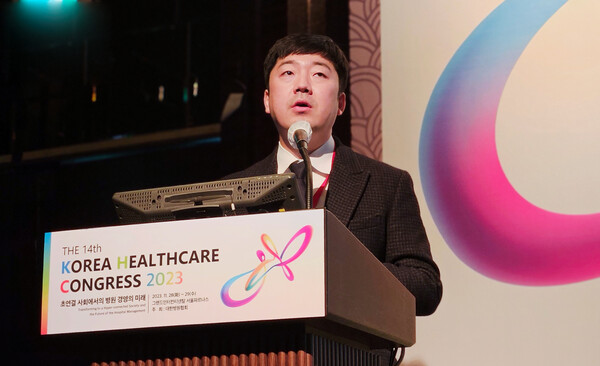There is a growing consensus that reimbursement reform is the only way to sustain Korea's national health insurance system in an era of low birth rates and growth.
Experts emphasize that healthcare providers, consumers, and administrators must recognize that "they can no longer do things the same way" and focus on protecting critical and essential medical care.
They reiterated reimbursement reform should be the starting point to restore the healthcare system through creating a win-win medical ecosystem at "The 14th Korea Healthcare Congress 2023" (KHC 2023) organized by the Korean Hospital Association at the Grand InterContinental Seoul Parnas in southern Seoul on Wednesday.

Dr. Jung Jae-hun, professor of preventive medicine at Gachon University College of Medicine, said that the reimbursement system should be changed and a new funding structure should be established to ensure healthcare security. He pointed out that the current debate on the essential care crisis and medical workforce issues should come after that because Korea's indicators are deteriorating "so rapidly that even a pessimist would find it alarming."
"The time is over when macroeconomic or external circumstances can solve healthcare problems," Professor Jung said. “We need to address health insurance and the healthcare paradigm itself. If we don't change that, we're doomed to uncertainty (no matter what measures we take) in the face of an essential care crisis and healthcare workforce structure."
He went on to say, "Healthcare providers, consumers, and administrators all have to bear the losses. Other ‘non-essential care’ coverage must be reduced, or access must be curtailed to cover critical and essential care. Now, we have to ask the public to accept and agree that we can no longer afford to cover minor conditions."
Essential healthcare, which suffers from "market failure" in the fee-for-service system, "should not be like owner-operators but become a fire department or a police station, he emphasized. The state should run cardiovascular disease centers and regional emergency medical centers under the concept of a social safety net, Jung stressed, adding that the reimbursement system and funding structure for these areas should be changed.
"To establish a healthcare delivery system for public care or essential care, a tax-based or alternative reimbursement system must be introduced," Jung said. "Essential healthcare services provided by the private sector should be made 'semi-public,' like public transportation, and the state should show its willingness to invest more actively and increase its role."
Professor Cho Hee-sook at Kangwon National University School of Medicine suggested a "sharing economy" model.
"Let’s consider giving incentives, such as value-based public policy rewards, to medical institutions that share manpower and resources with local healthcare vulnerable areas," she said.
In addition to establishing a "patient-centered, regionally complete healthcare delivery system" by promoting "network care" in such areas, she said, the uniform payment structure that "generates a lot of outpatient visits and hospitalizations" should be abandoned.
"The fee-for-service system favors those with more resources. It cannot help become rich-get-richer, poor-get-poorer situation,” Professor Cho said. “Now, based on the value of publicity, we need to create an environment where large hospitals can boldly engage in regional rotation and dispatch."

